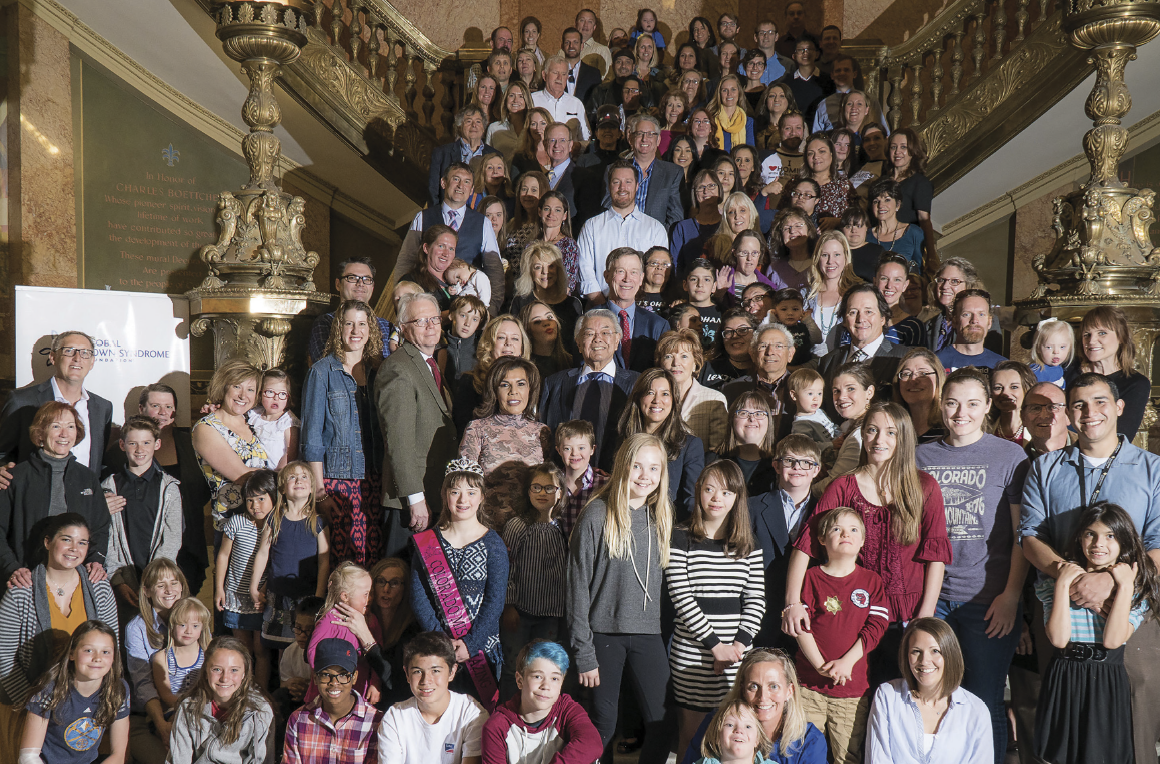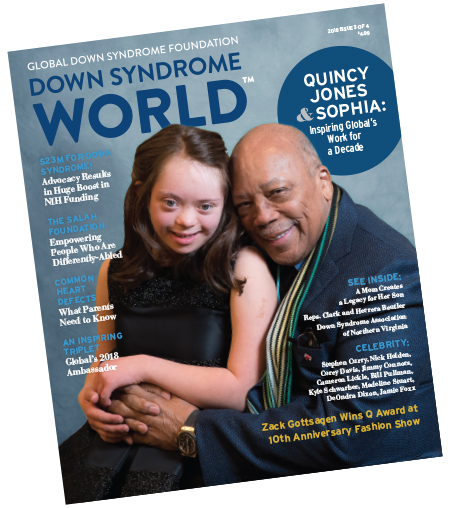Global Down Syndrome Foundation Advocacy Leads to $23 Million Increase for Down Syndrome Research at the NIH
August 2nd, 2019 by Global Down Syndrome Foundation

From Down Syndrome WorldTM Issue 3 2018
THANKS TO GLOBAL’S GROWING NATIONWIDE NETWORK OF ADVOCATES AND SELF-ADVOCATES, BRILLIANT AND PASSIONATE SCIENTISTS, AND OUR CONGRESSIONAL CHAMPIONS — SENATORS ROY BLUNT (R-MO), PATTY MURRAY (D-WA), AND CHRIS VAN HOLLEN (D-MD), AND REPRESENTATIVES TOM COLE (R-OK), ROSA DELAURO (D-CT), CATHY MCMORRIS RODGERS (R-WA), AND PETE SESSIONS (R-TX) — DOWN SYNDROME RESEARCH HAS A NEW HOME AT THE NATIONAL INSTITUTES OF HEALTH AND, FOR THE FIRST TIME IN 20 YEARS, HAS RECEIVED ITS FIRST REAL BOOST IN FUNDING. THE AGENCY’S “INCLUDE” PROJECT SPELLS OUT EXACTLY HOW THESE HARD-EARNED FUNDS WILL BE USED.
 This article was published in the award-winning Down Syndrome World™ magazine. Become a member to read all the articles and get future issues delivered to your door!
This article was published in the award-winning Down Syndrome World™ magazine. Become a member to read all the articles and get future issues delivered to your door! IN 2003, MICHELLE SIE WHITTEN gave birth to her first child, Sophia, who happens to have Down syndrome. On a mission to understand how to increase lifespan and improve health outcomes and quality of life, Whitten found herself meeting with then-Director of the National Institutes of Health (NIH), Elias Zerhouni, M.D. Dr. Zerhouni informed Whitten that despite being the leading cause of developmental delay in the U.S. and the world, Down syndrome
was one of the least-funded genetic conditions by the NIH, and he gave her an important piece of advice: “If you do just one thing, create an academic home for Down syndrome research … and rebuild the pipeline of science.”
And so started Whitten’s journey establishing the Global Down Syndrome Foundation and the Linda Crnic Institute for Down Syndrome, focused on research and medical care.
“Following that meeting, we started traveling to Washington, D.C. almost every month to educate Congress and the NIH on this issue,” says Whitten, President and CEO of Global.
“We met so many families whose children had health issues, and they helped us with petitions, phone calls, letter writing, and face-to-face meetings. In our very first letter writing campaign, 1,000 people contacted Congress advocating for more Down syndrome research funding. It wasn’t easy, and it would take a decade to succeed, but we made it happen!”
Fortunately, Global was able to attract scientists “brilliant of mind and heart” — Tom Blumenthal, Ph.D., Joaquín Espinosa, Ph.D., and Huntington Potter, Ph.D. Dr. Espinosa, now the Executive Director of the Crnic Institute, has clearly mapped out how people with Down syndrome have a different “disease spectrum” where they are highly predisposed or protected from major diseases that represent 60 percent of all the deaths in the U .S. Most importantly he made a game-changing discovery recasting Down syndrome as an immune system disorder.
Armed with the support of the Down syndrome community and groundbreaking science, the pivotal point for Global came in fall 2017. On Wednesday, Oct. 25, 2017, for the first time in its history, the Appropriations Subcommittee on Labor, Health and Human Services, Education, and Related Agencies, which provides federal funding for the NIH, held a hearing on current and future research funding priorities for people with Down syndrome. The hearing included testimonies from Global and the Crnic Institute. Global had two goals: to move Down syndrome under a trans-NIH structure, since the condition touches so man y diseases, and to reverse the terrible disparity of funding.
The results were astounding, with the entire committee standing in ovation at the end of the hearing , primarily for the self-advocate testimony by Frank Stephens. The subsequent NIH funding increase was clearly led by Congressional champions: Chairs Rep. Cole and Sen. Blunt and Ranking Members Rep. DeLauro and Sen. Murray, as
well as Reps. McMorris Rodgers, Sessions, Mike Coffman (R-CO), and Cheri Bustos (D -IL).
At Global’s inaugural AcceptAbility Gala in Washington, D.C., Rep. Cole announced the historic and significant $23 million increase in Down syndrome research funding at the NIH from $35 million in fiscal year (FY) 2017 to $58 million in FY2018. A subsequent $98 million has been budgeted for FY2019.
The NIH has embraced the FY2018 Omnibus Appropriations Report and has created a truly trans-NIH effort. Under the office of the Director, Down syndrome research will now be managed by the trans-NIH consortium “INCLUDE” (INvestigation of Co-occurring conditions across the Lifespan to Understand Down syndromE). Eighteen NIH institutes and centers comprise the consortium, and the steering committee is led by three great supporters of Down syndrome research: Lawrence Tabak, D.D.S., Ph.D., NIH Principal Deputy Director and INCLUDE Chair; Diana Bianchi, M.D., Director of the Eunice Kennedy Shriver National Institute of Child Health and Human Development (NICHD); and Gary Gibbons, M.D., Director of the National Heart, Lung, and Blood Institute.
The FY2018 Omnibus Appropriations Report stated the following: “Down syndrome. The agreement directs the NIH Director to develop a new trans-NIH initiative — involving, at a minimum, NICHD, National Institute on Aging (NIA), and National Cancer Institute (NCI) — to study trisomy 21, with the aim of yielding scientific discoveries to improve the health and neurodevelopment of individuals with Down syndrome and typical individuals at risk for Alzheimer’s disease, cancer, cardiovascular disease, immune system dysregulation, and autism, among others. This initiative shall bring together research results that will be available to academic researchers, nonprofit organizations, and industry researchers. Funding for this trans-NIH initiative will supplement, not supplant, existing NIH funding levels for Down syndrome research.”
Like this article? Join Global Down Syndrome Foundation’s Membership program today to receive 4 issues of the quarterly award-winning publication, plus access to 4 seasonal educational Webinar Series, and eligibility to apply for Global’s Employment and Educational Grants.
Register today at downsyndromeworld.org!

 Experience our inspirational and groundbreaking videos and photos. Our children and self-advocates are beautiful AND brilliant!
Experience our inspirational and groundbreaking videos and photos. Our children and self-advocates are beautiful AND brilliant! Make sure your local Representatives are on the Congressional Down Syndrome Task Force.
Make sure your local Representatives are on the Congressional Down Syndrome Task Force.